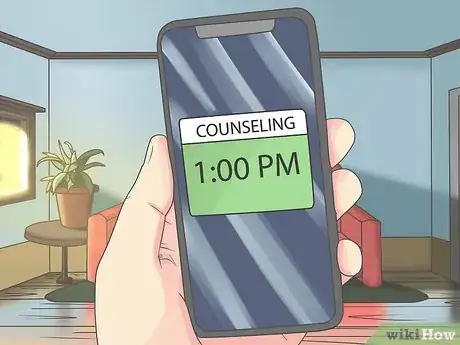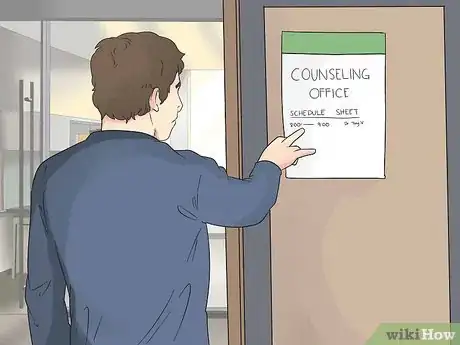This article was co-authored by Tracy Carver, PhD. Dr. Tracy Carver is an award-winning Licensed Psychologist based in Austin, Texas. Dr. Carver specializes in counseling for issues related to self-esteem, anxiety, depression, and psychedelic integration. She holds a BS in Psychology from Virginia Commonwealth University, an MA in Educational Psychology, and a Ph.D. in Counseling Psychology from The University of Texas at Austin. Dr. Carver also completed an internship in Clinical Psychology through Harvard University Medical School. She was voted one of the Best Mental Health Professionals in Austin for four years in a row by Austin Fit Magazine. Dr. Carver has been featured in Austin Monthly, Austin Woman Magazine, Life in Travis Heights, and KVUE (the Austin affiliate for ABC News).
There are 8 references cited in this article, which can be found at the bottom of the page.
wikiHow marks an article as reader-approved once it receives enough positive feedback. This article received 21 testimonials and 83% of readers who voted found it helpful, earning it our reader-approved status.
This article has been viewed 406,167 times.
Do you seem to wake up on the wrong side of the bed every day? If you find that negative thoughts are starting to control your life, take action before stress starts weighing you down. Learn to identify and eliminate negative thoughts, then replace them with positive exercises. Not only will opportunities start to present themselves, but you'll have the power to change your frame of mind, as well as your day.
Steps
Eliminating Negative Thinking
-
1Identify your negative thoughts. Some might immediately spring to mind, but if you have trouble pinpointing them, consider journaling. Write down a sentence or two describing the negative thoughts whenever you have them. [1]
- Look for thoughts that make you feel sad or discouraged, such as: blaming or shaming yourself for things that are not your fault, interpreting simple mistakes as indicative of personal failings, or imagining small problems are bigger than they are ("making a mountain out of a molehill").
- Notice if your negative thoughts fit common cognitive distortions, such as all-or-nothing thinking, overgeneralizations, jumping to conclusions, the fallacy of change, and so on.[2]
-
2Counteract a negative thought with a positive one. Once you've identified your negative thought, counteract it by saying something positive to yourself. For example, instead of saying, "I'm having a really bad morning," try saying something like, "This morning is rough, but my day will get better." Keep your mind on the positive. [3]
- If you're struggling with this, keep this one trick in mind: never say something to yourself that you wouldn't say to someone else.[4] Remind yourself to stay positive and it may just become a habit.
Advertisement -
3Pay attention to your vocabulary. Do you find yourself frequently using absolute terms? For example, "I'll never be able to do this," or "I always mess this up." Absolute terms are often exaggerated and leave no room for explanation or understanding.[5]
- Your vocabulary includes what you speak out loud to others, as well as how you talk to yourself, whether verbally or mentally.
-
4Remove overly negative words from your vocabulary. Extreme terms like "terrible" and "disaster" shouldn't apply to minor annoyances and inconveniences. Toning down your language can help you put negative experiences into a healthier perspective.[6] Replace these words with encouraging thoughts or praise.[7]
- When you do catch yourself using one of those words, immediately replace it in your thoughts with a less extreme term. "Terrible" can become "unfortunate" or "not as good as I had hoped." "Disaster" can become "inconvenience" or "challenge."
-
5Turn the bad into good. Few situations are totally good or totally bad. Finding the good in an upsetting situation helps bad experiences seem less stark. If you find yourself starting to think a negative thought, immediately stop and consider a positive aspect.[8]
- For example: Imagine your computer stopped working, forcing you to replace an internal component. While inconvenient, the experience also gave you the opportunity to learn a new skill or reaffirm an existing skill.
Making a Positive Day
-
1Start your day by thinking of 5 good things. They don't have to be lofty or ambitious things. They can be as simple as the smell of a good cup of coffee or the sound of your favorite song. Thinking of these things and saying them out loud means you start each day focusing on the positive. This creates an uplifting foundation for the rest of the day, making it more difficult for negativity to grow.[9]
- While you may feel silly verbalizing positive statements or affirmations, studies have shown that saying positive things out loud will actually make you more likely to believe what you're saying.[10] This can make you happier and more focused if you're vocalizing positive thoughts.
-
2Enjoy your day. Though you may be busy, little things can keep your spirits high and give your mind fewer reasons to stray into negative habits. Don't take things so seriously. Allow yourself to relax, laugh, and smile. Take opportunities to socialize and surround yourself with supportive positive people.[11]
- If you find yourself feeling stressed, take a short break and think of something other than the source of your stress.
-
3Practice healthy habits. Negative thinking and stress both reinforce one another. While negative thinking can create stress, other unhealthy living habits can contribute to the problem as well. Make an effort to eat fresh, nutritious food whenever possible, exercise regularly, and get plenty of sleep.
- You may find that exercise is actually a good way to distract your mind from negative thoughts.[12]
- Avoid smoking, excessive drinking, or any other substance habits that put strain on your body.
-
4Control your environment. You are not helpless to your thoughts. If you're unhappy with something, change it. Playing music, layering clothes so you are never too warm or too cold, and adjusting lighting are just a few ways you can empower yourself against the feelings of helplessness associated with stress.
- After making the changes, congratulate yourself on the improvement to your mood. Actively adjusting your mindset will make it easier to remove negative thoughts in the first place.
-
5Decompress and relax in the evening. Find a quiet, comfortable place and set aside time to relax. Mentally review your day and identify five positive things you experienced. Say each positive thing out loud or write them down in a journal.
- You might also consider writing down things you're thankful for. In doing so, you're more likely to begin seeing the positive in things.[13]
Seeking Outside Counsel
-
1Find a counselor or therapist. If you feel overwhelmed by your negative experiences, you may benefit greatly from speaking to a counselor, in addition to practicing positive thinking exercises. Look for a therapist trained in Cognitive-Behavioral Therapy. He or she will be able to help you train your mind to think positively.[14]
- To find a therapist you trust, ask a friend who has sought counsel or therapy before. You can also get a referral from your doctor.
-
2Set up a single appointment. Think of it as a check-up for your state of mind. You are under no obligation to stay if you feel too uncomfortable and there's no rule saying you must regularly see this therapist.
- Make the appointment with an open mind. Hope that the counselor can help you. If not, you can always find a counselor that you feel more comfortable with.
-
3Describe your negative feelings to your counselor. Remember that therapy is confidential and safe, so you can be totally honest. The more honest you are with your counselor, the better he or she will be able to help.
- Be sure to describe how these negative thoughts make you feel. Explain how often you experience them and what you usually do to deal with them.
-
4Make additional appointments as needed. If you felt comfortable with your therapist, make another appointment or two. Remember that it will take more than a single session to work through your negative thoughts.
- Don't get discouraged if you feel your time with a particular counselor was unproductive. You can seek out a different therapist until you find one that makes you feel comfortable.
Expert Q&A
-
QuestionWhat causes negative thoughts?
 Tracy Carver, PhDDr. Tracy Carver is an award-winning Licensed Psychologist based in Austin, Texas. Dr. Carver specializes in counseling for issues related to self-esteem, anxiety, depression, and psychedelic integration. She holds a BS in Psychology from Virginia Commonwealth University, an MA in Educational Psychology, and a Ph.D. in Counseling Psychology from The University of Texas at Austin. Dr. Carver also completed an internship in Clinical Psychology through Harvard University Medical School. She was voted one of the Best Mental Health Professionals in Austin for four years in a row by Austin Fit Magazine. Dr. Carver has been featured in Austin Monthly, Austin Woman Magazine, Life in Travis Heights, and KVUE (the Austin affiliate for ABC News).
Tracy Carver, PhDDr. Tracy Carver is an award-winning Licensed Psychologist based in Austin, Texas. Dr. Carver specializes in counseling for issues related to self-esteem, anxiety, depression, and psychedelic integration. She holds a BS in Psychology from Virginia Commonwealth University, an MA in Educational Psychology, and a Ph.D. in Counseling Psychology from The University of Texas at Austin. Dr. Carver also completed an internship in Clinical Psychology through Harvard University Medical School. She was voted one of the Best Mental Health Professionals in Austin for four years in a row by Austin Fit Magazine. Dr. Carver has been featured in Austin Monthly, Austin Woman Magazine, Life in Travis Heights, and KVUE (the Austin affiliate for ABC News).
Licensed Psychologist It could be a variety of things. In some cases, it's a maladaptive strategy someone develops to cope to a stressful or anxiety-inducing situation. In other cases, it could just be your nervous system overreacting to a situation. Sometimes, emotional and mental illnesses can cause negative thoughts. It could be any number of things.
It could be a variety of things. In some cases, it's a maladaptive strategy someone develops to cope to a stressful or anxiety-inducing situation. In other cases, it could just be your nervous system overreacting to a situation. Sometimes, emotional and mental illnesses can cause negative thoughts. It could be any number of things.
References
- ↑ http://www.calmclinic.com/anxiety/symptoms/bad-thoughts
- ↑ https://positivepsychologyprogram.com/cognitive-distortions/
- ↑ http://www.everydayhealth.com/health-report/major-depression-living-well/cognitive-behavioral-therapy-techniques.aspx
- ↑ http://www.mayoclinic.org/healthy-living/stress-management/in-depth/positive-thinking/art-20043950?pg=2
- ↑ http://life.gaiam.com/article/positive-thought-strategies-help-you-achieve-your-goals
- ↑ Tracy Carver, PhD. Licensed Psychologist. Expert Interview. 7 January 2021.
- ↑ http://life.gaiam.com/article/positive-thought-strategies-help-you-achieve-your-goals
- ↑ http://life.gaiam.com/article/positive-thought-strategies-help-you-achieve-your-goals
- ↑ http://www.mayoclinic.org/healthy-living/stress-management/in-depth/positive-thinking/art-20043950?pg=1
- ↑ https://labs.psych.ucsb.edu/kim/heejung/kimkofrontier.pdf
- ↑ http://www.mayoclinic.org/healthy-living/stress-management/in-depth/positive-thinking/art-20043950?pg=2
- ↑ http://www.calmclinic.com/anxiety/symptoms/bad-thoughts
- ↑ http://www.everydayhealth.com/health-report/major-depression-living-well/cognitive-behavioral-therapy-techniques.aspx
- ↑ Tracy Carver, PhD. Licensed Psychologist. Expert Interview. 7 January 2021.
About This Article
To control negative thoughts, say five positive things out loud in the morning so you have an uplifting start to your day. For example, you might say you're looking forward to a cup of coffee or listening to your favorite song. When you have a negative thought, try to turn it around and make it positive by saying something like, "This morning is rough, but my day will get better," rather than "I'm having a terrible day." Also, try to remove overly negative words from your vocabulary whenever you catch yourself using them, like terrible or disaster, since these words over-exaggerate how bad things are. For tips on how to get rid of negative thoughts by keeping a journal or seeking outside help, keep reading!












































































